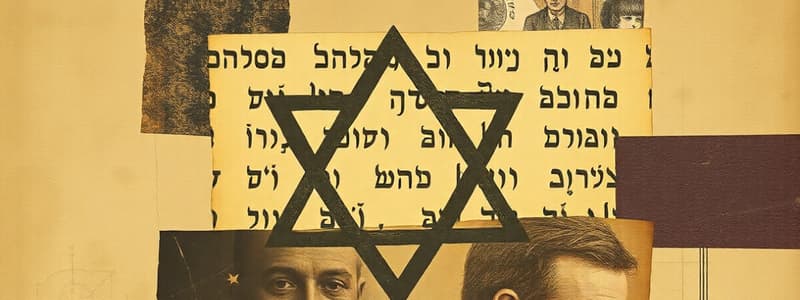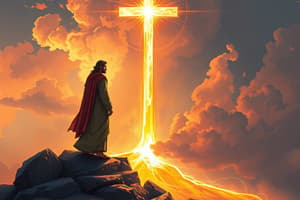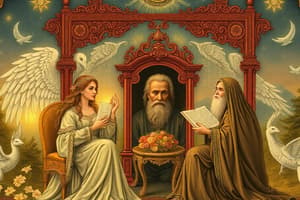Podcast
Questions and Answers
Which practice was central to observant Jews in the ancient world?
Which practice was central to observant Jews in the ancient world?
- Mediating disputes between tribes within the Hebrew community.
- Gaining political power through military leadership.
- Achieving economic prosperity through trade and craftsmanship.
- Personally adhering to God's instructions as recorded in sacred texts. (correct)
How did urban life impact Jewish society?
How did urban life impact Jewish society?
- It created new specialized economic opportunities, especially in crafts and trade. (correct)
- It reinforced the communal use of land and tribal identity.
- It led to a decreased focus on family relationships and marriage.
- It diminished the importance of religious traditions within the community.
What was the significance of the Temple of Jerusalem?
What was the significance of the Temple of Jerusalem?
- It was intended to be the religious heart of the kingdom, a symbol of Hebrew unity and God's approval. (correct)
- It functioned as the main marketplace for trade and commerce.
- It was a center for agricultural innovation and development
- It served primarily as a military fortress against the Philistines.
In what way(s) did the Hebrews adopt aspects of the culture of older, well-established peoples in Canaan?
In what way(s) did the Hebrews adopt aspects of the culture of older, well-established peoples in Canaan?
What is the concept of the Covenant's significance in Judaism?
What is the concept of the Covenant's significance in Judaism?
What was the role of prophets such as Jeremiah, Ezekiel, and Isaiah in Hebrew society?
What was the role of prophets such as Jeremiah, Ezekiel, and Isaiah in Hebrew society?
What contributed to the Hebrews not having their own state until the 20th century?
What contributed to the Hebrews not having their own state until the 20th century?
How did the role of women manifest itself in Hebrew society?
How did the role of women manifest itself in Hebrew society?
What does the term "Torah" refer to?
What does the term "Torah" refer to?
How did the Hebrews transition relate to land ownership as they settled in Canaan?
How did the Hebrews transition relate to land ownership as they settled in Canaan?
How was marriage viewed in ancient Jewish culture?
How was marriage viewed in ancient Jewish culture?
What role did Saul play among the Hebrews, according to the Hebrew Bible?
What role did Saul play among the Hebrews, according to the Hebrew Bible?
Why were sons especially desired in ancient Jewish families?
Why were sons especially desired in ancient Jewish families?
What was the primary function of the Ten Commandments?
What was the primary function of the Ten Commandments?
How did the Kingdom of Judah contribute to the development of Judaism?
How did the Kingdom of Judah contribute to the development of Judaism?
What is the Hebrew Bible, and how does it relate to Judaism and Christianity?
What is the Hebrew Bible, and how does it relate to Judaism and Christianity?
Which leader captured Jerusalem and made it the religious and political center of the realm?
Which leader captured Jerusalem and made it the religious and political center of the realm?
What is a central belief of Judaism?
What is a central belief of Judaism?
What was the primary role of religious leaders in Judaism?
What was the primary role of religious leaders in Judaism?
What was Solomon's key contribution to the Kingdom of Israel?
What was Solomon's key contribution to the Kingdom of Israel?
What challenge did the Hebrews face when settling in Canaan?
What challenge did the Hebrews face when settling in Canaan?
What happened to the kingdom established by David and Solomon after Solomon's death?
What happened to the kingdom established by David and Solomon after Solomon's death?
What is meant by the term "Abrahamic religions?"
What is meant by the term "Abrahamic religions?"
How did the Hebrews initially organize themselves before the development of urban life and a more centralized political structure?
How did the Hebrews initially organize themselves before the development of urban life and a more centralized political structure?
What was the understanding of goodness in ancient Judaism?
What was the understanding of goodness in ancient Judaism?
Flashcards
Judaism
Judaism
A monotheistic religion originating with the Hebrew people, documented from the first millennium BCE.
Torah
Torah
The first five books of the Hebrew Bible, containing laws, history, and traditions.
Covenant
Covenant
An agreement between God and the Hebrew people, where God promised blessings and protection in exchange for worship.
Prophets in Judaism
Prophets in Judaism
Signup and view all the flashcards
Ten Commandments
Ten Commandments
Signup and view all the flashcards
Hebrew Law
Hebrew Law
Signup and view all the flashcards
Jewish Rituals
Jewish Rituals
Signup and view all the flashcards
Monotheism in Judaism
Monotheism in Judaism
Signup and view all the flashcards
Synagogues
Synagogues
Signup and view all the flashcards
Hebrew Monarchy
Hebrew Monarchy
Signup and view all the flashcards
Jerusalem
Jerusalem
Signup and view all the flashcards
Temple of Jerusalem
Temple of Jerusalem
Signup and view all the flashcards
Israel and Judah
Israel and Judah
Signup and view all the flashcards
Old Testament
Old Testament
Signup and view all the flashcards
Yahweh (YHWH)
Yahweh (YHWH)
Signup and view all the flashcards
Hebrews
Hebrews
Signup and view all the flashcards
Abrahamic Religions
Abrahamic Religions
Signup and view all the flashcards
Dietary Laws
Dietary Laws
Signup and view all the flashcards
Study Notes
- Judaism is a monotheistic religion originating with the Hebrew people, documented starting in the first millennium BCE.
- Despite never being widespread, Judaism's concepts heavily influenced later belief systems and spread through diasporas.
Introduction
- Traditions were written down during the first millennium BCE, including those of the Hebrews.
- The Hebrews briefly formed two small kingdoms in Canaan, between the Mediterranean and the Jordan River.
- Though politically minor compared to empires like Egypt and Babylon, the Hebrews developed a new monotheistic religion.
- Their faith centered on worshipping an all-powerful god, "YHWH" (often spelled "Yahweh").
- The Hebrews began writing down their traditions, laws, history, and ethics from the late 600s BCE, compiled into the Torah's five books.
- The Hebrew Bible includes more history, traditions, advice, prayers, hymns, and prophecies; Christians adopted it as the Old Testament.
- These texts form the basis of Judaism, named after the Kingdom of Judah, which significantly shaped these religious traditions.
- Most early Hebrew information comes from the Bible, with some support from archaeological evidence.
- Interpreting biblical findings has led to centuries of scholarly and religious debates.
Religious Ideas
- The core concept in Judaism is the Covenant, an agreement between the people and God.
- God promised Abraham blessings for him and his descendants if they followed God; Judaism, Christianity, and Islam consider this event part of their shared origin as "Abrahamic religions."
- God appeared to Moses, leading the Hebrews out of Egyptian enslavement.
- God's covenant with the Hebrews promised protection as his chosen people if they worshipped only him.
- Prophets like Abraham, Moses, Jeremiah, Ezekiel, and Isaiah served as intermediaries between God and the Hebrews.
- Much of the Hebrew Bible consists of their writings, understood as messages from God.
- God gave the Hebrews the Ten Commandments, concerning worship and ethics.
- These commandments covered religious observances and prohibitions like stealing, lying, killing, swearing, and coveting.
- A detailed code of conduct, including rules about eating, holy days, menstruation, sex, and marriage, developed from the Ten Commandments as Hebrew law, though its practice during the biblical period is unclear.
- Jewish rituals demonstrating devotion included prayer, communal worship, studying sacred texts, and household observances.
- Observant Jews in the ancient world were tasked with adhering to God's instructions in sacred texts.
Society and Family Life
- The Hebrews were originally nomadic pastoralists, herding sheep and goats, and organized into related tribes.
- They transitioned to settled agriculture in Canaan, with some living in cities.
- Communal land use shifted to family or private ownership, and Jewish traditions replaced tribal identity.
- Urban life led to specialized economic roles, especially in crafts and trade, often passed down through families.
- Women worked in fields in rural areas and in shops in cities.
- Marriage and family were central in Jewish life, with celibacy discouraged and thinkers/priests (male) were typically married.
- Marriage was considered a family matter, and having children was viewed as a religious duty.
- Sons were especially valued for maintaining the family line and property.
- The firstborn son inherited the household leadership.
- Mothers initially educated children, with fathers taking over as boys aged.
- Formal schooling included religious texts in schools or synagogues.
Political Developments and the Spread of Judaism
- The Hebrews faced spiritual, military, and political challenges upon settling in Canaan, sometimes worshipping local agricultural gods despite prophetic warnings.
- The Bible identifies the Philistines as the greatest military threat to the Hebrews.
- Saul led the Hebrews against the Philistines and established a monarchy.
- David captured Jerusalem and made it the religious and political center.
- Solomon constructed cities, palaces, fortresses, roads, and the Temple of Jerusalem, symbolizing Hebrew unity and divine approval in the tenth century BCE.
- The kingdom split after Solomon's death into Israel (north) and Judah (south), with Jerusalem as Judah's center.
- War between the two weakened both, leading to conquest by stronger neighbors and exile.
- The area became part of empires, including Persian, Greek, and Roman.
- Jews did regain their own state until the establishment of Israel in the twentieth century.
Studying That Suits You
Use AI to generate personalized quizzes and flashcards to suit your learning preferences.




